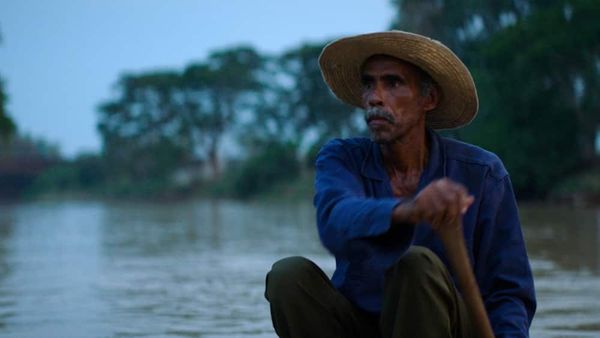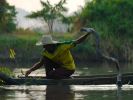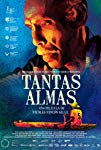Eye For Film >> Movies >> Valley Of Souls (2019) Film Review
Valley Of Souls
Reviewed by: Jennie Kermode

It’s quiet out on the river at night, the thick blackness of the surrounding jungle instilling a deep sense of solitude, the patient lapping of the water obscuring other sounds. The fisherman and his companion, in their small wooden boat, get most of the way back to the village before they realise that anything is amiss. Then they see the blazing lights and the guns, hear the shouting. The fisherman glimpses his two sons in the thick of it, being manhandled by the paramilitaries. Even in the inky black shadows by the water’s edge, we can see the desperation in his eyes, but there is nothing he can do. Nobody needs to say it. To go rushing in would be suicide.
When morning brings with it a new stillness, rent only be the sounds of birds and the endless water, the fisherman has a new duty. His companion is gone. The village is quiet. He is sure that if his sons have been taken, they will not survive. But his thoughts are not of some hopeless rescue attempt, for all the he longs to find them alive. Rather, he must find their bodies and bury them with the proper rites in order to ensure that their souls are not condemned to wander the Earth forever.

Paramilitary groups have been active in Colombia since the end of the Sixties and there is evidence that they have been used by political and corporate groups alike to massacre inconvenient indigenous people and peasants or drive them off their land. Naturally this has inspired a lot of anger, expressed both in politics and in art, but what’s striking about Nicolás Rincón Gille’s film is how little anger we see beyond that coming from the paramilitaries themselves. This is a story about the deep loss that precludes other emotions. Swallowed up by it, the fisherman concerns himself only with his duty. Yet from the place of stillness created by his grief, he observes the world as an animal might, with no pre-set expectations or bias, and what he sees is often beautiful.
Following the river in his simple boat, scanning its shores, the fisherman observes the scars of war and the wonders of the natural world all woven together as if to put human ambition in its place, to remind us that even those shouting and shooting are nothing more than angry primates engaged in dominance displays. He meets people who abuse him and people who help him although it avails them nothing to do so. He meets people dealing with their own desperation. Only occasional mementos of civilisation cut through. A cycling race that soldiers are watching on television. A Colombian national football team top which he wears as much in memory of his sons as as a symbol of his own identity. That identity is worn as much into his body as his mind: long, lean, calloused hands, arms set with the wiry knots that come from endless rowing. He is a part of the landscape, an expression of its own need for healing.
Though the scenery is vast and beguiling, Gille keeps his camera close, keeps the story small and personal. The fisherman is capable of extraordinary humility and courage in the face of adversity; it is his strength, as much as his sorrow, that makes him a compelling figure. Though his task seems at times to be impossible and we wonder if there can be any life for him beyond it, he pursues it with unshakeable commitment: the simple expression of a father’s love.
Reviewed on: 04 Mar 2020
















